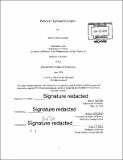Palmyra's ephemeral empire by Steven John Holcomb.
Author(s)
Holcomb, Steven John
DownloadFull printable version (9.678Mb)
Other Contributors
Massachusetts Institute of Technology. Department of Humanities.
Advisor
William Broadhead.
Terms of use
Metadata
Show full item recordAbstract
The story of the third century AD rebellion of the Palmyrene Empire against the Roman Empire remains one of the most curious and fascinating episodes from the ancient world. Palmyra, a wealthy desert city-state, was neither the largest, richest, nor most significant city of the Roman Near East, yet it was the city that capitalized on Rome's weakness in the third century to lead its own independence movement, taking over vast swathes of wealthy territory for a brief period from approximately 270 to 273 AD. But why was Palmyra the city to lead the revolt against Rome? And how was it so successful for such a short time? At first glance, it would appear that Palmyra was ill-suited to successfully carve an independent state. Yet the city's distinctive history and culture actually suggest that it was uniquely positioned to contest Rome for supremacy of the Near East. Palmyra's economic, military, and cultural history left it in an exceptional situation in the third century. This thesis supplements readings of the textual evidence preserved by literary sources including the Historia Augusta and Zosimus with an examination of archaeological, epigraphic, and numismatic evidence to reveal the importance of Palmyra's history in understanding the episode of the Palmyrene Empire. The city's leaders capitalized on their past history and present position to attempt their challenge against Rome which, while ill-fated, is more understandable in the context of the period.
Description
Thesis: S.B., Massachusetts Institute of Technology, Department of Humanities, 2016. Cataloged from PDF version of thesis. Includes bibliographical references (pages 77-78).
Date issued
2016Department
Massachusetts Institute of Technology. Department of HumanitiesPublisher
Massachusetts Institute of Technology
Keywords
Humanities.